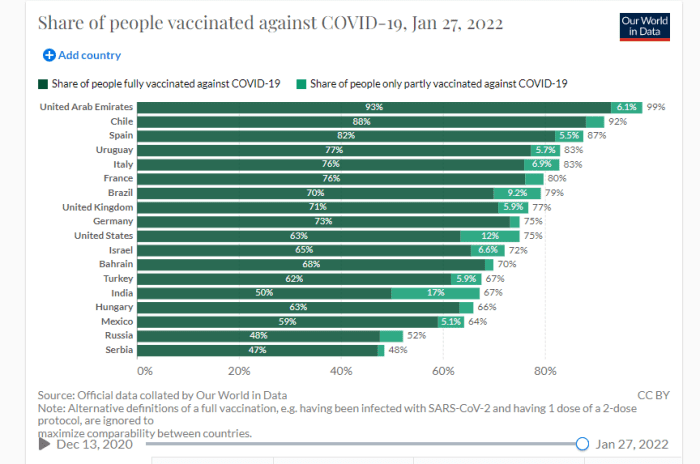This post was originally published on this site
The world reached a COVID-19 vaccination milestone Friday of 10 billion doses administered globally, according to Our World in Data, but wealthier countries account for the vast majority, while poorer ones have been left behind.
Only 9.8% of people in low-income countries have received a first vaccine dose, according to the research company, while wealthy countries have had three doses and some such as Israel are starting to offer a fourth.
Researchers at Duke University have estimated that the world needed at least 11 billion doses to fully inoculate 70% of its population of about 7 billion, but vaccine equity has been a challenge from the get-go, despite repeated warnings from the WHO that leaving major areas of the world unvaccinated would allow new variants to emerge that could prove resistant to vaccines.
The highly infectious omicron variant which was detected in December and has gone on to become the leading variant in most places is just such an example. Omicron has caused many breakthrough cases in people who are fully vaccinated and have had a booster dose, but they are usually mild or asymptomatic.
The majority of hospitalizations and deaths from omicron are in unvaccinated people, who remain at high risk of contracting it as it spreads rapidly through communities.

Source: Our World in Data
“It will be key that people in all countries — not just in rich countries — receive the required protection,” the World in Data team wrote.
The World Health Organization is targeting vaccinating 70% of the world’s population this year and has said reaching that goal would take the world out of the “acute phase” of the pandemic, the period in which it remains an international emergency.
WHO Director-General Tedros Adhanom Ghebreyesus said this week that could happen if countries pull together to get vaccines to those parts of the world that have not received them and bolster testing, sequencing and monitoring of new variants.
“If countries use all of these strategies and tools in a comprehensive way, we can end the acute phase of the pandemic this year — we can end COVID-19 as a global health emergency, and we can do it this year,” said Tedros Adhanom Ghebreyesus, WHO Director-General, in a statement.
The World in Data team is skeptical that will happen.
Omicron cases and hospitalizations are declining in the U.S., according to a New York Times tracker, although deaths, which are a lagging indicator are steadily climbing. The U.S. is averaging 2,530 deaths a day, the tracker shows, up 34% from two weeks ago.
New cases are down 27% at 589,225 on average a day, while hospitalizations are averaging 151,066, up 1% from two weeks ago.
Other COVID-19 news you should know about:
• Merck
MRK,
and partner Ridgeback Biotherapeutics said Friday that data from six preclinical studies of their molnupiravir COVID-19 pill showed “consistent antiviral activity” against the omicron variant of the coronavirus that causes COVID-19. The preclinical studies were conducted independently in Belgium, Czech Republic, Germany, Poland, the Netherlands and the U.S. Molnupiravir is currently authorized for use in 10 countries, including the U.S., the U.K. and Japan.
• Novavax
NVAX,
will supply 5 million doses of its protein-based COVID-19 vaccine to Israel as part of an advance purchase agreement, with the Israeli Ministry of Health also taking an option to buy an additional 5 million doses. Novavax is currently conducting two Phase 3 trials of the vaccine involving about 30,000 participants in the U.S. and Mexico, as well as a trial involving about 15,000 people in the U.K. Data from both trials was published in the New England Journal of Medicine and showed high efficacy and safety. The vaccine has been granted conditional marketing authorization in the EU and an emergency use listing by the World Health Organization. It is currently under review by other regulatory bodies.
• China locked down an area neighboring the capital Beijing this week following a handful of reported COVID cases, but made no public announcements about the fresh restrictions with just a week until the Winter Olympics, AFP reported. About 1.2 million people in Xiong’an New Area — a new economic zone 100 kilometers southwest of Beijing — are no longer allowed to enter or leave their residential compounds, the news agency reported, citing local virus prevention staff.
• Finland will ease COVID restrictions from Feb. 1, according to its health minister. The Nordic nation of 5.5 million has maintained some of the European Union’s lowest incidence rates throughout the pandemic, but infections have increased in recent weeks due to the Omicron variant.
See now: U.S. consumer spending slumps after omicron outbreak
Here’s what the numbers say
The global tally of confirmed cases of COVID-19 rose above 366.9 million, and the death toll is now more than 5.63 million, according to data aggregated by Johns Hopkins University.
The U.S. leads the world with 73.4 million cases and 878,472 fatalities.
The Centers for Disease Control and Prevention’s vaccine tracker is showing that 211 million people living in the U.S. are fully vaccinated, equal to 63.6% of the total population.
Some 86 million have received a booster, equal to 41% of the fully vaccinated.

